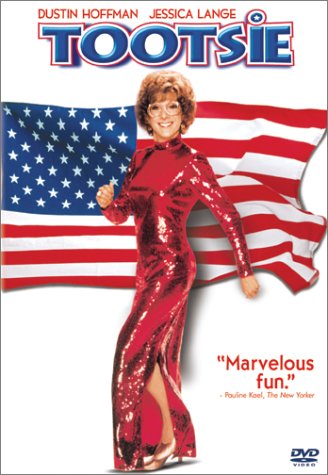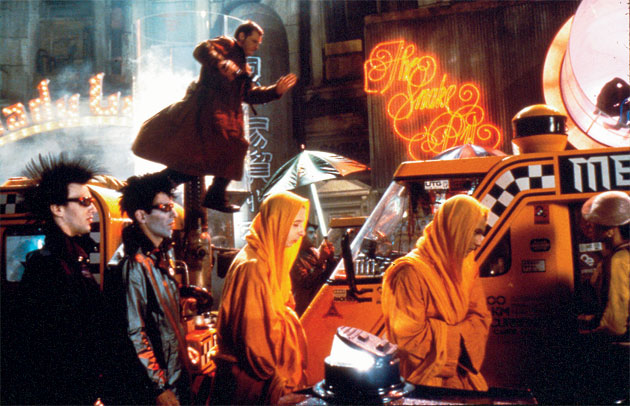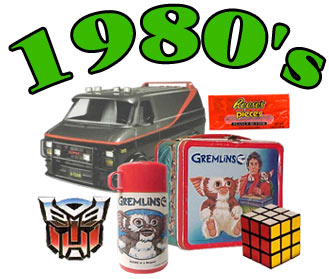Here is list of all the movies we watched, by decade!
The 1950's!
All About Eve, Kiss Me Deadly, Touch of Evil, Julius Caesar, High School Confidential!, Lost Lonely and Vicious
The 1960's!
Easy Rider, Cleopatra, The Cut-Ups, Towers Open Fire, William Buys a Parrot, Dynamite Chicken, Take the Money and Run, Bonnie and Clyde
The 1970's!
M*A*S*H, Taxi Driver, THX 1138, Jaws, 1941, Apocalypse Now
The 1980's
Blue Velvet, Blade Runner, Do The Right Thing, Repo Man, Tootsie
We also watched a film called Drive, He Said, which Mr. Turner would not stop recommending to us. He even gave us his personal VHS recorded in like the late 80's off Cinemax. Spoiler Alert!: The movie was weird.
Thanks for reading!
Thursday, June 12, 2008
Friday, June 6, 2008
Tootsie

Tootsie is the adorable story of an out of work actor's, Dustin Hoffman, attempts to find work in New York City. When he can't make it as a male actor, he dresses up like a woman and gets a job on a General-Hospital-like soap.
Emily: I had seen this before and we wanted to watch something cute because Do the Right Thing was sad, Repo Man was weird, and the cocktail of disturbing that was the combination of Blue Velvet, Apocalypse Now, and Blade Runner all in a row was a little much for the two of us.
Kamala: Tootsie is an adorable light-as-air comedy about a man trying to make it as a female actor in NYC. It isn't one of those movies that you praise artistically afterwards, but it was fine, I mean it was cute. We hadn't watched enough of those typical big studio movies in the 80's and so we decided to watch this one. It was produced by the now-late Sydney Pollack. He cast Bill Murray as Hoffman's roommate. IMDB says that all of his lines were improvised but I don't think that is such a feat because he basically said the same thing with the same annoying deadpan face every time. Like "this is getting creepy Michael" or "do you want help with that brassiere?"
Emily: Oh snap
anyways Tootsie was also jolly redhead giant Geena Davis's film debut. Dustin Hoffman and Sydney Pollack worked closely together to make this film. The idea came to Hoffman to play both a man and a woman while working on Kramer vs. Kramer, which is a good movie just so everyone knows. We don't really have much to say about this one, it was one of those PG sightly racy family comedies and Dustin Hoffman is an unbelievable jerk to this woman he is working on a play with as "Michael." I mean Kamala and I had to pause the movie to make sure that he really had just I mean he was horrible. Tootsie is adorable, as we have said, and if you are looking for something light and happy to watch in between films about a robot apocalypse, apocalypse now, and a small town gangster/pervert, Tootsie is the film for you!
"No one ever laughed during the shooting of any scenes of the film. It's only funny because of its story structure." -Sydney Pollack

Labels:
1980's,
Columbia Pictures,
Comedy,
Dustin Hoffman
Thursday, June 5, 2008
Repo Man

Kamala: Repo Man is this weird independent cult film from 1984. It is about this 18 year old punk from LA who becomes a repo man when Bud, a veteran repo man played by Harry Dean Stanton, tricks him into repossessing someone's car and taking it to their lot.
Emily: This movie made no sense to me. I had to keep pausing it so Kamala could explain things. Emilio Estevez is the young disillusioned punk kid who becomes a repo man, there were a lot of car chases and people getting fried by the radiation (the neutron bomb, which vaporizes people but not buildings) from the trunk of the Chevy Malibu. Speaking of that-the glowing trunk of the car is probably an homage to the glowing suitcase that set people on fire from Kiss Me, Deadly. Repo Man brought its director, Alex Cox critical acclaim and it's cited as one of the first contemporary independent movies. The fact that it wasn't a very "deep" movie (a fact that Kamala had to keep reminding me of) did not at all take away from its enjoyability.
Kamala: This movie has become a cult classic because it's full of aliens and stuff about time travel, and also humorously portrays the LA punk scene of the 1980's. The conceit of labeling all the food and drink as exactly what it was (Cereal simply marked "Cereal," beer labeled "beer," etc) is neat. There are a lot of interconnecting motifs in this movie. One example of this is one man in the Repo yard talks about how if one person is thinking about a plate of shrimp, another person will say "plate" or "shrimp" or "plate of shrimp." And these words appear a lot throughout the film.
Emily: Practically every character in this movie appears more than once, even very minor characters like Otto's friend Kevin. This movie is just choc-full of weird stuff that only really attentive people or people who have seen it more than once can really pick up on-something I noticed though, is that whenever we see a car making a turn, it signals the opposite direction.
Kamala: The soundtrack is made up of really awesome punk songs and the score is fairly reminiscent of Tarantino and I really want it so I can listen to it in my car.
Emily: I think the movie had a lot to do with the punk movement. Alex Cox directed Sid & Nancy (a movie about Sex Pistol's bassist Sid Vicious and his relationship with Nancy Spungen). The Circle Jerks, a rather famous California-based punk band, appear in a lounge scene. Also Black Flag has several songs on the soundtrack.
Kamala: Like Paul Schrader (who worked as a taxi driver and based his screenplay off of the experience) Alex Cox worked as a repo man in LA and based the screenplay off of some of his experiences. This movie is definitely worth watching if you're into odd sci-fi cult movies.
Emily: Pretty crazy.
Labels:
1980's,
Emilio Estevez,
Harry Dean Stanton
Do The Right Thing

Kamala: I'm glad that Emily liked this one. Although it was no surprise to me as the Symington family has close ties to the black community. In fact, her brother won the DC African-American history bee two years in a row.
Emily: Ha. Actually though this movie is great. It is culturally significant, dealing with race conflicts in the Brooklyn neighborhood of Bedford-Stuyvesant. Its centers on Mookie, played by Spike Lee, a young father working as a pizza delivery boy for an Italian-American owned neighborhood pizzeria. The majority of the film, like an hour and 45 of two hours, takes place entirely on one extremely hot summer day.
Kamala: It was really well shot. There were a lot of really interesting angles, especially one shot of Mookie walking over a little girl's chalk drawing in the street. The colors also were intensified in a way that made you really feel how how it was supposed to be. I also liked the motif of having Public Enemy's song Fight the Power playing from a boombox. It gave a realistic sense of being in this two or three block neighborhood with the same people walking in and out of your awareness. I don't know how to say that without sounding a little silly...
Emily: This film was extremely controversial when it was released. In the news it was impugned as a vehicle to incite poor black neighborhoods to riot. It also received a LOT of critical acclaim, being nominated for two academy awards and the palme d'or at Cannes to name a few. This film fits perfectly into our project because Spike Lee is a great example of one of those independent directors that emerged in the late eighties.
Kamala: The early eighties were overrun with big studio abominations and the lack of good movies out there plus increasingly available VHS home movies made it easy for anyone, not just film students, to become familiar with older films. Many of these directors were able to produce extremely new and interesting films such as Do the Right Thing, Repo Man, or, moving into the early nineties, Reservoir Dogs. Also, it was becoming easier and cheaper for people to have access to recording and editing equipment, allowing for lots of low-budget movies to be made and released by new filmmakers.
Emily: Do the Right Thing is a fresh, extremely moving film that stays with you.
Labels:
1980's,
Spike Lee,
Universal International
Wednesday, June 4, 2008
Blade Runner

Kamala: Ridley Scott is either the most anal director ever, or the most dissatisfied with his studio's desired cut of his favorite film. There is an entire Wikipedia article dedicated to the SEVEN versions of Blade Runner out there. There is an "international cut," a "theatrical cut," a "director's cut," a "final cut," and more. We watched the american theatrical cut, reworked by the studio to be easier to understand and complete with a tacked on happy ending.
Emily: Kamala said she had seen this one before, but she had seen the grittier, pessimistic director's cut from 1992, with an entirely different ending. Similarly to Brazil, one of both of our favorite films, which everyone should see, Blade Runner was repeatedly bowdlerized by studio execs who failed to see the brilliance of the director's own devastating ending.
Emily: Blade Runner is the story of Rick Deckard's forced return from his self-imposed retirement from being a blade runner. In the near future (2019...I will be 29) a technology company has released an android, the Nexus 6, that is so close to being human that, when the replicants, as they are called, start to rebel against their human masters only certain, specially trained policemen can tell the difference between them and real people. These men are called blade runners. Deckard is forced back into his career to catch 4 replicants who are particularly dangerous. Their names are Batty, Pris, Leon, and Zhora.
Kamala: What I like the most about Blade Runner is the conflict between what is human and what isn't. Is Deckard any more human than Batty just because he was born, and not created? Isn't Rachel human because she believes herself to be? Is Deckard a replicant? Rachel's character shows that basically anyone can be a replicant, so what is the barrier of the knowledge available to a human about itself? This film is thoughtful and thought-provoking. Also, the futuristic view of Los Angeles is horrifying and yet realistic. An urban nightmare where most of the healthy people with at least some means are living in off-planet colonies, and those remaining on earth speak a strange street language cobbled together from Spanish, German, Japanese, and French.
Emily: The world is a human tapestry of weirdoes. Hare Krishnas, Punks, Japanese thugs, etc.

Labels:
Film Noir,
Harrison Ford,
Ridley Scott,
Sci-Fi,
Warner Brothers
Blue Velvet

Blue Velvet was one of the independent movies released in the 1980's by a very interesting, very deranged director, David Lynch. It is the story of a small town college graduate named Jeffrey Beaumont who, after finding a severed human ear in a field, mixes himself up with a lounge singer who is being victimized by a local thug/drug lord/sex pervert. Most of the movie isn't exactly school appropriate so we aren't sure how to talk about this one.
Kamala: But first, background. David Lynch directed Eraserhead in the late 70's. It caught the attention of Mel Brooks, and he was given money to make The Elephant Man. The film was a critical success, and Lynch was contracted by Dino De Laurentiis to film a version of Frank Herbert's Dune. Lynch agreed to do it on the condition that he would be allowed to film another movie however he wanted to. That movie was Blue Velvet. He has later described it as his most personal movie, dealing with his childhood in the small town of Spokane, Washington. This movie was set in Lumberton, North Carolina which is funny because I've been to Lumberton.
Emily: I like David Lynch movies generally, especially Mulholland Drive. This one was a little slow at first, but much much easier to understand. He did not eschew narrative continuity. Blue Velvet is credited with revitalizing Dennis Hopper's career, and he is rivetingly great as the sociopathic murderer. Also Kyle MacLachlan has a role in Desperate Housewives.
Kamala: That's too bad. From David Lynch movies to Desperate Housewives. Also he looks exactly, EXACTLY like a young Jon Zeljo, which is pretty scary considering like some of the stuff that he does in the film. Yet also strangely fitting....
Emily: Except for not, because Desperate Housewives is awesome....
Kamala: I generally like movies that have a lot of awesome bright colors and light. The opening sequence was a shot of brightly red roses in front of a white picket fence, in front of a strikingly blue sky. It looked like one of those Salvador Dali paintings of roses in the sky, beautiful.
Emily: I liked that shot too. The use of Roy Orbison's song "In Dreams" was great, as well as the titular pop song "Blue Velvet."
Kamala: I have "seen" one other David Lynch movie, his newest called Inland Empire, and let me tell you, Blue Velvet was far more enjoyable. For one, I saw most of the Inland Empire's three hours through my fingers because it was absolutely terrifying. Moreso, it was virtually plotless, centering on Laura Dern, one of Lynch's favorites who plays a teenager smitten with Jeffrey in Blue Velvet, but occasionally drifting in and out of Rabbits, Poland (?), and reality. Blue Velvet on the other hand was intensely watchable. The villain was despicable, disturbed, and well acted, the femme fatale/victim was suitably messed up in the head, and the main character was one of the most morally conflicted I had ever seen. He alternated between sweet, naive, creepy, driven, and pseudo-rapist personalities.
Emily: This movie was amazing and I recommend it highly.

The 1980's

The legacy of the 1970's left on American film was the public's acceptance of more graphically realistic depictions of sex and violence. Enter directors like Ed Wood, John Waters, and David Lynch. We think it would be incomprehensible for someone like Lynch to make a movie that could win an Academy Award in the 1960's or even the early 1970's. The Elephant Man is like, well, an elephant while Easy Rider, which was controversial for its time, is like something a lot smaller than an elephant. The 1980's also saw a flourishing of actual independent films, rather than "independent" studios like American Zoetrope that worked inside the system financing directors with interesting visions. The formation of Robert Redford's Sundance Institute helped to finance many independent directors like Jim Jarmusch, Gus Van Sant, Stephen Soderbergh, and more especially in the early 1990's. Which we won't get to. But who cares. Spike Lee, Quentin Tarantino, Kevin Smith, and others released independent films towards the end of the 1980's and into the early 1990's. They were called the video generation because, due to the increasing availability of VHS home videos, they were able to amass huge libraries of movies from all over the world that would influence their work. This can be seen in the large number of references to other films, such as Kiss Me Deadly for example, in Tarantino's work.
The studios lost money in the 1980's too perhaps because of all the crappy blockbusters that Kamala hates that they made or perhaps because of all the cool independent movies coming out that were pretty available for viewing.
Subscribe to:
Posts (Atom)
